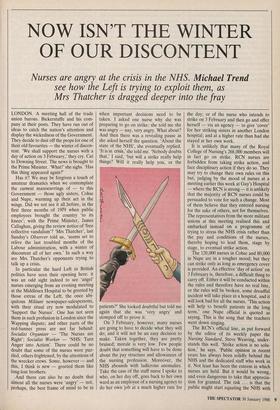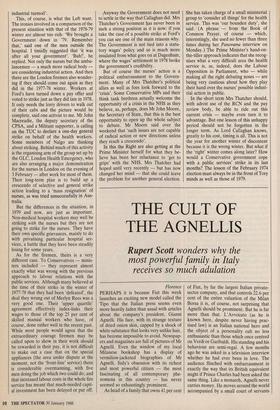NOW ISN'T THE WINTER OF OUR DISCONTENT
Nurses are angry at the crisis in the NHS. Michael Trend
see how the Left is trying to exploit them, as Mrs Thatcher is dragged deeper into the fray
LONDON. A meeting hall of the trade union barons. Bickerstaffe and his com- pany at their posts. They have run out of ideas to catch the nation's attention and display the wickedness of the Government. They decide to dust off the props for one of their old favourites — the winter of discon- tent. 'We shall support the nurses with a day of action on 3 February,' they cry. Cut to Downing Street. The news is brought to the Prime Minister. 'What!' she sighs. 'Has this thing appeared again?'
Has it? We may be forgiven a touch of amateur dramatics when we contemplate the current manoeuvrings of — to this Government — those ugly sisters, Cohse and Nupe, warming up their act in the wings. Did we not see it all before, in the first three months of 19.79 when public employees brought the country 'to its knees'; with the Prime Minister, James Callaghan, giving the review notice of 'free collective vandalism'? 'Mrs Thatcher', last Sunday's Observer told us, 'seems set to relive the last troubled months of the Labour administration, with a winter of discontent all of her own.' In such a way are Mrs Thatcher's opponents trying to talk up a crisis. In particular the hard Left in British politics have seen their opening here: it was an odd sight indeed to see 'angel' nurses emerging from an evening meeting at the Middlesex Hospital to be greeted by those extras of the Left, the once ubi- quitous Militant newspaper-salespersons, with their ritual cry now modulated to 'Support the Nurses'. One has not seen them in such profusion in London since the Wapping dispute; and other parts of the red-banner press are not far behind: Socialist Organiser — 'The Nurses are Right'; Socialist Worker — 'NHS: Turn Anger into Action'. There could be no doubt that some of the nurses were puz- zled, others frightened, by the attentions of the wrecker crews. Some, however — and this, I think is new — greeted them like long-lost brothers.
And there can also be no doubt that almost all the nurses were 'angry' — not, perhaps, the best frame of mind to be in when important decisions need to be taken. I asked one nurse why she was preparing to go on strike: she told me she was angry — nay, very angry. What about? And then there was a revealing pause as she asked herself the question. 'About the state of the NHS', she eventually replied. 'It is in crisis,' she told me. 'Nobody doubts that,' I said, 'but will a strike really help things? Will it really help you, or the patients?' She looked doubtful but told me again that she was 'very angry' and stomped off to prove it.
On 3 February, however, many nurses are going to have to decide what they will do; and it will not be an easy decision to make. Taken together, they are pretty bruised; morale is very low. Few people doubt that something will have to be done about the pay structure and allowances of the nursing profession. Moreover, the NHS abounds with ludicrous anomalies. Take the case of the staff nurse I spoke to who, on her day off, goes back to her own ward as an employee of a nursing agency to do her own job at a much higher rate for the day; or of the nurse who intends to strike on 3 February and then go and offer herself — via an agency — to give 'cover' for her striking sisters in another London hospital; and at a higher rate than had she stayed at her own work.
It is unlikely that many of the Royal College of Nursing's 268,000 members will in fact go on strike. RCN nurses are forbidden from taking strike action, and face disciplinary action if they do so. They may try to change their own rules on this but, judging by the mood of nurses at a meeting earlier this week at Guy's Hospital — where the RCN is strong — it is unlikely that the majority of RCN nurses could be persuaded to vote for such a change. Most of them believe that they entered nursing for the sake of others, not for themselves. The representatives from the more militant unions at this meeting realised this and embarked instead on a programme of trying to stress the NHS crisis rather than the pay and conditions of the nurses, thereby hoping to lead them, stage by stage, to eventual strike action.
The 120,000 nurses in Cohse and 80,000 in Nupe are in a tougher mood; but they can strike only as long as emergency cover is provided. An effective 'day of action' on 3 February is, therefore, a difficult thing to carry off. Either it will be conducted within the rules and therefore have no real bite, or the rules will be broken, some dreadful incident will take place in a hospital, and it will look bad for all the nurses. 'This action will help to benefit patients in the long term,' one Nupe official is quoted as saying. This is the song that the teachers went down singing.
The RCN's official line, as put forward by the editor of its weekly paper the Nursing Standard, Steve Weaving, under- stands this well. 'Strike action is no solu- tion,' he says. 'Public opinion in recent years has always been solidly behind the NHS and the dedicated staff who work in it. Not least has been the esteem in which nurses are held. But it would be wrong, and even dangerous to take that apprecia- tion for granted. The risk ... is that the public might start equating the NHS with industrial turmoil'.
This, of course, is what the Left want. The ironies involved in a comparison of the present situation with that of the 1978-79 winter are almost too rich: 'We brought a Government down in '79. Remember that,' said one of the men outside the hospital. I timidly suggested that 'it was after all your government'. `Bah!', he replied. Not only the nurses but the ambu- lancemen — a much more radical body — are considering industrial action. And then there are the London firemen also wonder- ing if they should come out again as they did in the 1977-78 winter. Workers at Ford's have turned down a pay offer and voted to strike just as they did late in 1978. It only needs the lorry drivers to walk out of their cabs and the picture would be complete, said one. activist to me. Mr John Macreadie, the deputy secretary of the CPSA, and a Militant supporter, is calling on the TUC to declare a one-day general strike on behalf of the health workers. Some members of Nalgo are thinking about striking. Behind much of this activity is the organising arm of the group set up by the GLC, London Health Emergency, who are also arranging a major demonstration for the nurses in London on the evening of 3 February — after work for most of them. Their long-term plan is to build up a crescendo of selective and general strike action leading to a 'mass resignation' of nurses, as was tried unsuccessfully in Aus- tralia.
But the differences in the situation, in 1979 and now, are just as important. Non-medical hospital workers may well be striking with the nurses but they are not going to strike for the nurses. They have their own specific grievances, mainly to do with privatising particular hospital ser- vices, a battle that they have been steadily losing for some years.
As for the firemen, theirs is a very different case. To Conservatives — minis- ters included — they represent almost exactly what was wrong with the previous approach to labour relations with the public services. Although many believed at the time of their strike in the winter of 1977-78 that they had been 'defeated', the deal they wrung out of Merlyn Rees was a very good one. Their 'upper quartile' agreement effectively index-links their wages to those of the top 25 per cent of skilled manual workers who have, of course, done rather well in the recent past. While most people would agree that the extraordinary courage firemen may be called upon to show in their work should be rewarded in their pay, it is not difficult to make out a case that on the special appliances (the area under dispute at the moment, not the 'front-line' service) there is considerable overmanning, with five men doing the job which two could do; and that increased labour costs in the whole fire service has meant that much-needed capit- al investment has been delayed or put off. • Anyway the Government does not need to settle in the way that Callaghan did. Mrs Thatcher's Government bas never been in such a strong position as it is now: if you take the case of a possible strike at Ford's you can see one of the main reasons why. The Government is not tied into a statu- tory wages' policy and so is much more insulated from what goes on at Dagenham, where the wages' settlement in 1978 broke the government's credibility.
But of course the nurses' action is a political embarrassment to the Govern- ment. Many of Mrs Thatcher's political allies as well as foes look forward to the 'crisis'. Some Conservative MPs and their think tank brethren actually welcome the opportunity of a crisis in the NHS as they believe, as, perhaps, does Mr John Moore, the Secretary of State, that this is the best opportunity to open up the whole subject to debate. Mr Moore said over the weekend that 'such issues are not capable of radical action or new directions unless they reach a crescendo'.
In this the Right are also getting at the Prime Minister herself for what they be- lieve has been her reluctance to 'get to grips' with the NHS. Mrs Thatcher had hoped until very recently — but has now changed her mind — that she could leave the problem for another general election. She has taken charge of a small ministerial group to 'consider all things' for the health service. This was 'our bounden duty', she said. (A phrase — from the Book of Common Prayer, of course — which, interestingly, she used no fewer than three times during her Panorama interview on Monday.) The Prime Minister's hand-on- the-tiller approach indicates that she recog- nises what a very difficult area the health service is, as, indeed, does the Labour Opposition in Parliament, who — while making all the right debating noses — are being very cautious about how they play their hand over the nurses' possible indust- rial action in public.
In the short term Mrs Thatcher should, with adroit use of the RCN and the pay review body, be able to ride out this current crisis — maybe even turn it to advantage. But one lesson of this unhappy period should not be forgotten in the longer term. As Lord Callaghan knows, greatly to his cost, timing is all. This is not the year for another winter of discontent because it is the wrong winter. But what if the 'right' winter comes along later? How would a Conservative government cope with a public services' strike in its last months? The lesson of the February 1974 election must always be in the front of Tory minds as well as those of 1979.



















































 Previous page
Previous page